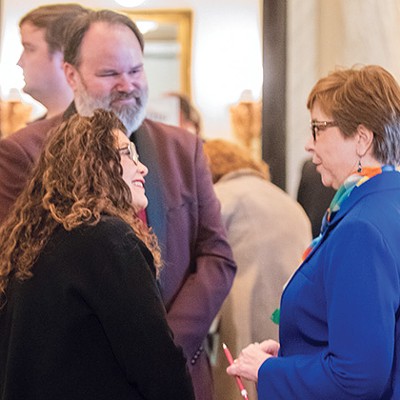A report published in the journal Pediatrics in July indicates the children of lesbian parents score higher than their peers in straight families on psychological markers related to self-esteem and confidence. The study also shows that these children fare better academically and are less prone to rule-breaking and aggressive behaviors.
The report was the result of research compiled as part of the National Longitudinal Lesbian Family Study, authored by Nanette Gartrell and Henny Bos. Gartrell, the principal investigator in the NLLFS, said the results were a surprise to her. Several studies have been conducted that indicate children of same-sex parents score about the same as their peers in development and social behavior, but no previous study indicated that the children might fare better in other areas.
Gartrell began the study in 1986, and it's the most thorough study to date on this subject. The study focused on planned lesbian families, not families with children from previous, heterosexual marriages where a woman "came out," divorced and later found a lesbian partner. It's a critical factor when considering the findings.
"This is the first generation conceived by artificial insemination in planned lesbian families," Gartrell said. "These mothers paved the way and attempted to make the world a safe place for their children. They were the mothers who, in an attempt to mitigate homophobia and the harassment their children would face, helped establish anti-bullying programs, helped educate teachers and administrators, and by these means helped benefit all children. The major factor here is that these were children that were highly desired."
Gartrell and her team of researchers were surprised the children scored so well in self-esteem and confidence because so many had been exposed to ostracism, teasing and harassment. By age 17, the study found that the stressors related to the treatment had dissipated.
"Obviously, there are some factors that may include family support and changes in education about appreciation for diversity that may be helping young people to come to a better place despite these experiences," Gartrell said in a June article in Time magazine.
Jennifer Borsch and Stacy Brooks, a Norman couple, are not the type of family in the NLLFS, but they are raising their sons in a same-sex household. They read through the results of the study, and Borsch said she really didn't know what to think.
"To be honest, I don't think being gay makes me a better parent," she said. "There are good and bad lesbian parents, just like there are good and bad straight parents."
It is a sentiment much in line with position statements from the American Academy of Child & Adolescent Psychiatry. In its Facts for Families series of newsletters, the academy states: "Current research shows that children with gay and lesbian parents do not differ from children with heterosexual parents in their emotional development or in their relationships with peers and adults. It is the quality of the parent/child relationship and not the parent's sexual orientation that has an effect on a child's development."
Borsch and Brooks have been together for five years now, and their sons, ages 8 and 9, were first in Oklahoma City Public Schools and have now transferred to Norman Public Schools. Borsch said they had heard horror stories of how the children of same-sex parents have been treated, but their experience has been very positive.
"We've been very, very fortunate," she said. "The (OKCPS site) principal was very supportive."
Borsch said she believes being an active parent has contributed to the boys' adjustment.
"When we were at Linwood Elementary, I was involved in PTA, and I volunteered daily at the school," she said. "I had a chance to interact with the faculty, and they got to know us."
Gartrell said because adolescents in same-sex families do face discrimination or ostracism in schools with a fairly high degree of frequency, parents have to address complex issues like sexuality and tolerance early. That dynamic may contribute to the ability of the children to adapt to stressors better than their peers.
The study has had its detractors, most notably A. Dean Byrd, president of the National Association for Research & Therapy of Homosexuality (NARTH). The organization encourages reparative therapy " the belief that sexual orientation can be changed " for gays and lesbians. Byrd attacked the study on three grounds in a response published on the NARTH website: the accuracy of self-reporting studies, the demographics of the study group and the selection process.
Gartrell said she is happy to respond to critics who are actually researchers who understand science, but she believes the criticisms like the ones offered by NARTH reveal a poor understanding of science.
"We stated our limitations up front," she said, "and the critiques we're seeing tee off at that point. In a perfect world, we would have identical test groups and control groups, but we can't get that, so we state study limitations. Even with the stated limitations, the critics fail to understand that the demographics of our test group show that a larger percentage of the control group (was) in a higher socioeconomic status than our test group. Since higher socioeconomic status confers advantages, we would expect the control group to fare better. They did not."
Gartrell said she has begun to recruit a new generation of researchers to continue the study in hopes that the group can be tracked until they have their own children. She hopes that policy makers, teachers, ethicists and parents will see the practical applications for the study.
"I particularly hope they see what this study indicates about the tragedy of potential GLBT parents not being able to adopt or work as foster care parents because of laws that prohibit them based on sexual orientation," she said.
Read the study here.











